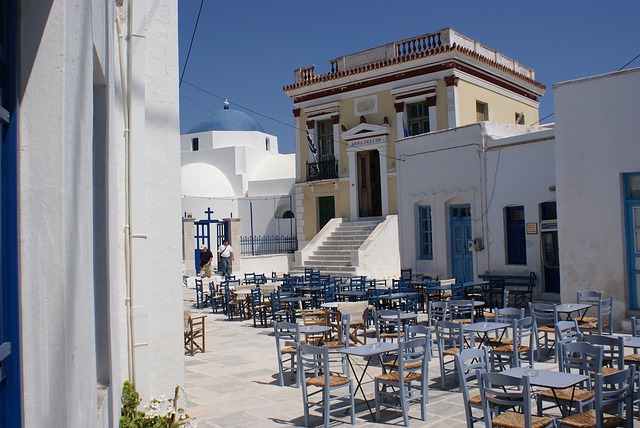Time to vote: election vocabulary in Greek Posted by Ourania on May 24, 2019 in Vocabulary
On the 26th of May the Greek citizens will vote for European Parliament Members and for local government officials. The voting age is 17. There are 23 political parties and coalitions participating in the European Parliament election. In this post, there is basic vocabulary related to the elections.
#1. ψηφίζω: to vote
Example:
Αποφασίσατε τι θα ψηφίσετε;
Have you decided who will you vote for (lit: what will you vote)?
#2. η ψηφοφορία: ballot, poll
Η ψηφοφορία αρχίζει στις 7 το πρωί και σταματάει στις 7 το βράδυ.
The ballot starts at 7 a.m. and ends at 7 p.m.
#3. η ψήφος: vote
Πόσες ψήφους πήρε ο αδερφός σου;
How many votes did your brother get?
#4. το ψηφοδέλτιο: ballot paper
Υπάρχουν σαράντα διαφορετικά ψηφοδέλτια.
There are forty different ballot papers.
#5. η κάλπη: ballot box
Παρακαλώ, ρίξτε τον φάκελο με το ψηφοδέλτιο στην κάλπη.
Please, throw (put) the envelop with the ballot paper in the ballot box.
#6. το παραβάν: voting booth
Στο παραβάν μπαίνει μόνο ένα άτομο.
Only one person enters the voting booth.
#7. ο σταυρός: cross
Αυτό το ψηφοδέλτιο δεν έχει σταυρούς. Είναι λευκό.
There are no crosses on this ballot paper. It is blank.
#8. οι εκλογές: elections
Οι εκλογές γίνονται πάντα Κυριακή.
The elections always take place on Sunday.
#9. ο υποψήφιος, η υποψήφια: candidate
Ο αδερφός τους είναι υποψήφιος Δήμαρχος.
Their brother is a candidate for Mayor.
#10. ο,η ευρωβουλευτής: member of European Parliament
Αυτοί είναι οι υποψήφιοι ευρωβουλευτές του κόμματός μας.
These are the MEP candidates of our political party.
#11. ο,η δήμαρχος: mayor
Έχουμε τον ίδιο δήμαρχο εδώ και είκοσι χρόνια.
We have the same mayor for the last twenty years.
#12. ο,η πρόεδρος: the Head of the council in a small town or village
Ο πρόεδρος καταχράστηκε τα χρήματα της κοινότητας.
The Head misused the community funds.
#13. ο,η περιφερειάρχης: prefect
Ο περιφερειάρχης άκουσε τα προβλήματα των λιμενεργατών.
The prefect listened to the problems of the dockworkers.
#14. το αποτέλεσμα, τα αποτελέσματα: result (s)
Το βράδυ θα έρθουν οι φίλοι μας και θα δούμε τα αποτελέσματα των ευροεκλογών στην τηλεόραση.
Τhis evening, our friends will come and we will watch the European election results on the television.
#15. το exit poll
Το exit poll δίνει μία ιδέα για το αποτέλεσμα.
The exit poll gives an idea about the result.
#16. η δημοσκόπηση: survey, opinion poll
Οι δημοσκοπήσεις δείχνουν προβάδισμα του κόμματός μας.
The opinion polls show that our political party has advantage.
#17. η αποχή: abstention
Η αποχή έφτασε το σαράντα τοις εκατό.
The abstention reached 40%.

Build vocabulary, practice pronunciation, and more with Transparent Language Online. Available anytime, anywhere, on any device.






Comments:
Kyriakos:
Γεια σου, Ουρανία
In an old post about colours ο σταυρός also appears in the phrase
Κυανούς Σταυρός. Can you explain why Κυανούς is accusative plural? I would have expected it to agree in number and case with Σταυρός!
Thanks
Kyriakos
Ourania:
@Kyriakos Γεια σου, Κυριάκο! Kυανούς an ancient Greek adjective. It is masculine, nominative case, that’s why it agrees with Σταυρός. The three genders are κυανούς, κυανή, κυανούν. Other adjectives like this are χρυσούς, χρυσή, χρυσούν / χαλκούς, χαλκή, χαλκούν etc.
Kyriakos:
@Ourania Γεια σου, Ουρανία και ευχαριστώ πολύ για την γρήγορη σου απάντηση.
I use http://www.neurolingo.gr/en/online_tools/lexiscope.htm to check declensions etc.
It has the κυανός, κυανή, κυανό for nominitive which must be the modern form, maybe for cyan – as in printer toner.
I should have got my ancient Greek grammar out instead!
Thanks again K